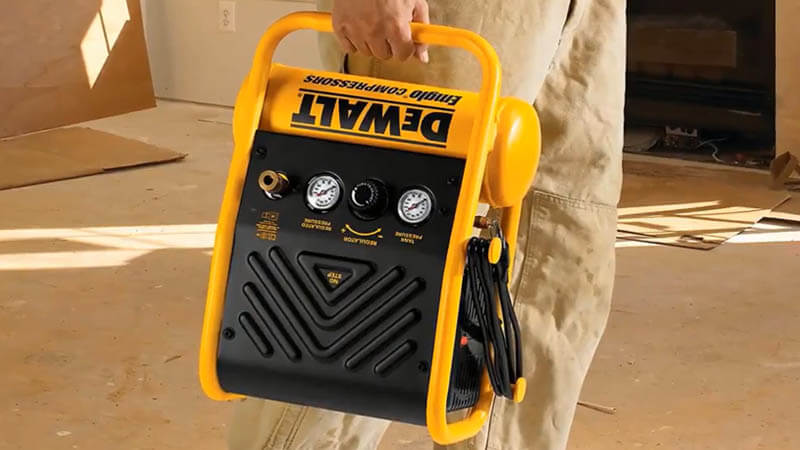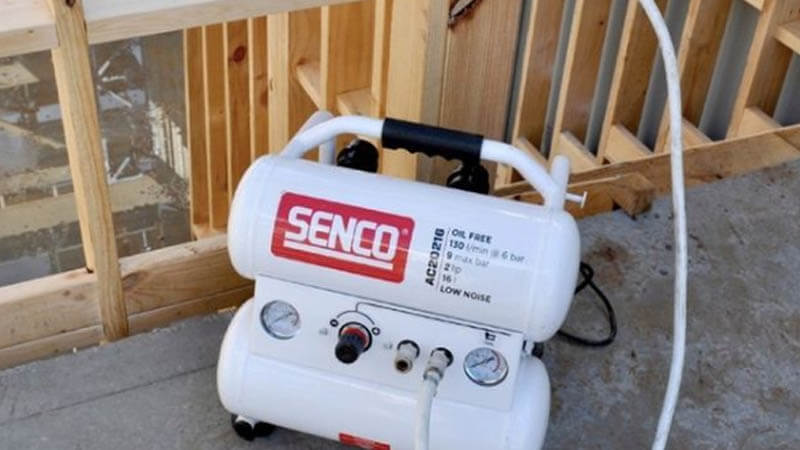Almost all of us are familiar with the fact that air compressors make noise. But when we’re talking about the quietest air compressors, you might wonder, what’s the quietest air compressor?
In terms of quietness, industrial scroll or rotary screw compressors are the best. As a comparison, you usually have conversations at a decibel level between 55 and 65. So we can say a 40-decibel air compressor can be called pretty quiet.
Additionally, air compressors compress atmospheric air into storage tanks under high pressure and transport it to the working area through pipelines from the storage tank. And this entire mechanism is responsible for generating loud noises.
However, there are more things to know about the noises of the air compressors and the quietest air compressors. And you are going to get every detail below in this article along with the tips to quiet your air compressor.
Let’s get it on!
What Does the Quietest Air Compressor Mean?
Air compressors can make a noise of up to 90 decibels. But 40 decibels is pretty quiet. If we mean the quietest compressor, it is in the 40–60 decibel range. But almost none of the best and quietest air compressors on the market are louder than 70 decibels. Finally, low-noise compressors largely depend on their capacity and size, making a difference.
Compensators produce noise due to friction as well. Air compressors with dynamic displacement have a lot of moving parts, which creates a lot more friction. As a result of having fewer moving components, positive displacement compressors tend to be less friction-heavy. In that case, dynamic displacement compressors would be quieter.
Why Do Compressors Sound Loud?
Several factors contribute to the loudness of air compressors, but friction is responsible for most of it. Metals can be loud when they hit or slide against each other. Air compressors are generally louder when they have more moving parts. It is true for motors as well.
Having many moving metal parts and producing combustion makes gas-powered compressors louder than electric compressors. It is also possible for the environment around your compressor to contribute to the noise it generates. Open spaces and smooth concrete floors can enhance any noise, including compressor noise.
How To Make an Air Compressor Quieter?
Since we are talking about quiet air compressors, if you don’t have one of these and instead have a louder one, find out how to quiet your loud air compressor.
1. Wrap Up the Compressor Motor
Air compressors run more quietly when you cover them with sound-deadening materials. You may have noticed this when you covered your hot water heater with this material. So, if you want to reduce noise, a sound-deadening mat is a good choice.
2. Change the Air Intake Location
The air intake is one of the most important parts of the air compressor. It is the part where the unit gets its air supply. It is possible to relocate the intake somewhere far away from where its noise will be less bothersome.
You can try to place it in garden sheds, basements, or garages. It’s a problem when you have a basement or a garage in your house because they’re still attached to it.
Therefore, some people move the intake outside. The backyard and side yards have more open spaces, so the compressor makes less noise. Additionally, you would hear your air compressor less since it would be far from your house.
3. Box it Up or Encapsulate it
You will, of course, hear your compressor quieter if you encapsulate it. In order to store your air compressor outdoors, you would need to build a spare room. If you put things on the walls to block out noise, like acoustic foam, you could barely hear the air compressor again.
Note: Building a small structure from scratch will be costly. You will also need to make sure that the room has enough ventilation and is big enough to fit the compressor. Unless you do this, the air compressor will overheat and blow up, catch fire, or explode as the air warms up.
4. Put a Muffler on the Intake
Another option might be a good idea to cover your air compressor’s intake with a muffler. Even though it takes a bit of effort, it is possible to reduce the noise level of your air compressor by four decibels.
Your air compressor’s intake is the place where you find this. Plug a two-sided air hose into your muffler and your intake, with one end at the muffler and the other end at the intake. Join the first and second hoses now.
What Are the Dangers of Loud Noise?
A typical air compressor operates between 40 dB and 100 dB, which is a large range. It is annoying to hear noisy compressors. There can be constant distractions from the noise of the loud motor starting and stopping.
You can lose your hearing if you are continuously exposed to loud noises close to your ears. In more cases, listening to loud noises repeatedly can cause hearing loss over time. It takes less time for hearing loss to occur when the sound is louder.
Those who do not wear hearing protection or do not allow their ears to rest between exposures are more likely to suffer hearing loss.
The Quietest Air Compressors: Tips for Shopping

If you like to silence your air compressor, you have one last option: replace it with a more compact, smoother, quieter unit. Both your sanity and your hearing will benefit from it. When choosing the quietest air compressor, you should keep these points in mind.
- Compressor Type: Inflators, pancakes, hot dogs, twin stacks, and single stacks are the five main types of compressors. So, while buying, make sure which type of compressor you need.
- Noise Level: The noise level of most air compressors ranges from 40 to 92 decibels (dB), but the quietest compressors range between 40 and 60 dB. In comparison, high-quality single-piston compressor pumps make less noise than entry-level models. Duplex pumps can compress the same amount of air with less movement. This makes them more efficient and quieter.
- Performance: Three key measurements: horsepower (hp), air pressure that’s shown in pounds per square inch (psi), and airflow capacity that’s shown in cubic feet per minute (cfm) show an air compressor’s working ability. 90 psi is the minimum pressure needed for most air tools to work properly.
- Number and Size of Tanks: Air compressors with quiet operation typically have one or two tanks that range from 1 gallon to more than 20 gallons in volume. Twin-stack air compressors take up less room because they combine two smaller air tanks into one larger one.
- Power Source and Portability: Diesel fuel, gasoline, or hard-wired electrical service are some of the power sources for large commercial air compressors. Compressors with large capacities will require hardwiring on a heavy-duty circuit. Again, an automobile outlet adapter or battery is suitable for small portable inflators. On the other hand, light-duty compressors powered by batteries have limited capabilities. Compressor configuration affects its portability, as well as its power source. In applications such as garages, vertical hand trucks are perfect for saving space while making it easier to move around a flat, smooth surface.
- Brand and Warranty: Make sure you read the fine print before purchasing a quiet air compressor after matching your needs with the list of compatible compressors. It is also important to consider how well the brand stands behind its products.
Manufacturers handle issues directly, even though the industry usually provides 1-year factory parts and labor warranty. But the warranty only covers problems caused by the manufacturer, not normal wear and tear, changes, abuse, etc.
Some of the Best Quiet Air Compressors, Based on Customer Reviews
Choosing a quiet air compressor requires consideration of comfort, convenience, and power output. Here are our picks for the best quiet air compressors based on our research of top retailer sites and our analysis of popular brands and models.
1. California Air Tools 8010 Air Compressor
The California Air Tools 8010 Air Compressor tops everyone’s favorite list of the quietest air compressors. It weighs just 35 pounds with a 3,000-hour life cycle and operates at a mere 60 decibels (dB).
2. DeWalt Pancake Air Compressor
This 30-pound, 50-foot-long compressor can deliver 2.6 SCFM of air at 90 psi of pressure normally and 165 psi of pressure at its peak. The sound it makes is 75.5 decibels.
3. California Air Tools CAT-4620AC Compressor
Senco PC1010 is the right machine for you if you want an efficient machine at an affordable price. Powered by a 1HP motor, it can generate pressures up to 120 psi and sound levels up to 65 dBA, similar to a normal conversation.
4. Master Airbrush Model TC-77 Compressor
If you want an air compressor with a small tank that won’t disturb your neighbors, there’s no need to look elsewhere. With its 18-horsepower motor, this 0.6 cfm unit can regulate air pressure between 0 and 57 psi. It has a 4.75-gallon capacity, and its sound level is 47 dB.
5. Senco PC1010N Portable Hot Dog Compressor
With a 0.5-horsepower motor that takes 2 minutes to fill the tiny 1-gallon tank, the Senco PC1010N Portable Hot Dog Compressor is not as powerful as others since it is easy to carry 21 pounds. The compressor operates at just 68 decibels, making it a quiet and portable device.
6. Makita MAC210Q Quiet Series Air Compressor
Makita offers ultra-quiet air compressors that are both small and powerful. With a noise level of 60 decibels, the 1-horsepower oil-free motor pumps 135 psi into the tank at 135 psi. The low-RPM operation and maintenance-free design make it more durable than its alternatives.
Conclusion
Choosing a quiet air compressor model will reduce noise dramatically, but no silent air compressor will be completely silent. Again, to reduce the loud noise of a louder air compressor, wrap the engine or even enclose your air compressor. Perhaps you should consider purchasing a new, quiet air compressor.

